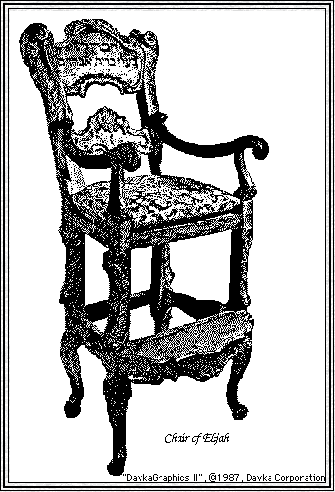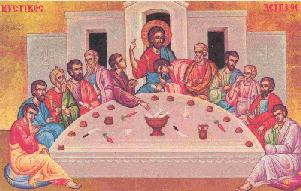Mary Suydam
![]() Department of Religion
Department of Religion
Mary Suydam
![]()
Mary Suydam Office: Ascension 302
Tues eve. Office Hours: T-Th 9-12
Ascension PBX 5656
I. Course Description: In this course we will examine the importance of blood in Judaism and Christianity, and the extent to which blood is perceived as gendered and/or enabling power. Although people in contemporary societies often view themselves as governed by a scientific perspective, religious ideas about blood often reflect much older conceptions. This seminar will explore the historical context and contemporary attitudes in Judaism about circumcision, menstruation, sexuality and the human body, and, in Christianity, about Jesus' redemptive blood, the Eucharist, and the human body (both saintly and otherwise).
II. Readings:
Brown, Peter. The Body and Society. Columbia University Press.
Douglas, Mary. Purity and Danger. Henry Holt Publishing.
Fishbane, Michael. Judaism. Harper San Francisco.
Frankiel, Sandra. Christianity. Harper San Francisco.
Stevens, Maryanne, ed. Reconstructing the Christ Symbol: Essays in Feminist Christology. Paulist Press.
Other readings will be available on course reserve. We will also be searching for data in both print and non-print sources, including the World Wide Web.
III. Structure of the Course: This course will be structured as a seminar in which every member will be expected to contribute. There will be occasional brief presentations by the teacher. Class will focus on serious discussion and presentation of weekly assigned material. You should come to class each week prepared to discuss the reading for that week. You should also bring the relevant reading materials. Each class will begin with a problem-solving or analytical exercise related to the topic to be discussed in class. Then we will discuss the in-class exercise and the readings.
Because I will not be presenting formal lectures, you will have weekly fact-finding assignments to provide context for the topics covered. In other words, each of you has some responsibility for structuring the background for our discussions. You will be expected to turn in a brief (one to two pages) typed paper and to report on your findings to the class. Because of the nature of the topics I expect that we will all be making extensive use of Internet resources. You are not expected to possess terrific computer skills -- acquiring computer skills will be part of the learning experience of this class for both students and professor.
Because of the structure of this seminar, your attendance is mandatory. If, for any reason, you miss more than two classes, you will be assigned an additional short paper.
IV. Fact-finding Assignments: These weekly assignments will require you to look up some information not provided in the readings. Remember: an important part of fact-finding is judging the source and quality of the information you find. You will also be required to take notes on any required course reserve readings and to periodically turn in these notes.
V. Class Project. As a class we will design a web site, linked to the Women's and Gender Studies web site devoted to the study of blood topics. No prior internet experience is necessary for this project. The site will consist of arranging, synthesizing, and making sense of the information we collect over the semester. Therefore, it is very important that we organize and collate this information during the course of the semester. This will be a group project.
VI. Grading: Seminar participation and in-class exercises: 25%
Fact-finding assignments and notes on reading: 25%
Class project: 50%
There will be no midterm or final examination for this course.
VII. Outline of Topics: (subject to change due to interest of class members)
Reading for next week: Genesis 17, Exodus 3-4, 19
Fishbane, chapters 1-3.
Find out about: the WMNS Blood web site.
Reading for next week: On reserve (choose 1):
People of the Body, chapters 1 and 2
Standing Again at Sinai, chapter 2
On Women and Judaism, chapters 3-5 (39-105)
Find out about: Passover; Biblical blood sacrifices; substitutions for sacrifice in post-Biblical Judaism

Reading for next week: Douglas, chapter 6
On reserve (choose 1): People of the Body, chapters 4 and 12
On Women and Judaism, 55-105 Right: Chair of Elijah
Standing Again at Sinai, chapter 5 used in circumcision
The Jewish Woman, 84-93; 105-125
Find out about: Jewish web sources on menstruation (niddah), sexuality, Rosh Hodesh
At right: a Jewish mikveh
Reading for next week: Douglas, chapters 3 and 5
Find out about: Search web sites on Judaism and kashrut; begin to design web site
Reading for next week: Frankiel, Christianity
Mark 14-16, Romans 2-3, I Corinthians 15
Find out about: Christianity's Jewish origins; Christianity's Roman origins

Reading for next 2 weeks: Brown, part I
Find out about: Christianity and sexuality; asceticism; saints
------October break--------------
Reading for next week: Brown, part III; Rubin, Corpus Christi, 1-82 (on reserve)
On Reserve (choose 1): Medieval debate on the Eucharist
Sister of Wisdom, chapters 3-4
Popular literature about the eucharist
Find out about: a bleeding saint (St. Francis, Becket) or one who uses blood as a metaphor (Catherine of Siena, Julian of Norwich, Juliana of Cornillon) or
Christian web sites on the Eucharist and beliefs about it
Reading for next week: On reserve (Choose 1):
Beckwith, Christ's Body, chapters 2-3 Right: St. Francis
Rubin, Corpus Christi, 83-163 with stigmata
Find out about: the priesthood and ministry in contemporary Christian churches
Reading for next week: Reconstructing the Christ Symbol, chapters 1-3
Find out about:
10. Nov. 9: Christology. Open topic.
Reading for next week: Reconstructing the Christ Symbol, chapters 4-6
-----------------------Thanksgiving Break-----------------------